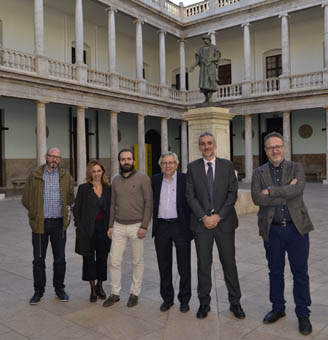
The Universitat de València sets in motion this academic year a new cultural project: the Escola Europea de Pensament Lluís Vives. Promoted by the Office of the Vice-Principal for Culture and Equality, with the participation of other individuals of the Public administration and civil society: The President of the Valencian government, the City Hall of Valencia, the Valencian Department of Transparency and Education, Research, Culture and Sports, the Acadèmia Valenciana de la Llengua, the Alfons el Magnànim Institute, the Escola Europea d’Humanitats and the Caixa Popular, the Escola Europea de Pensament Lluís Vives is born with the intention of becoming a space for reflection and open, participatory and critical debate about the most resounding issues in the present world and in the Valencian society.
On Tuesday, the vice-principal for Culture and Equality, Antonio Ariño, together with the representatives of the collaborating entities and the technical director, Ana Bonmatí, have presented the project in a breakfast for journalists held in the Gonzalo Montiel Hall in the historical building of the Universitat. “In the era of massive data, the Escola Europea de Pensament Lluís Vives becomes a space for reflection and slow reasoning, putting together specialists and the citizenship to discuss”, he said.
According to Ariño, the Escola Europea de Pensament Lluís Vives (http://www.escoladepensamentlluisvives.com) will basically have three different activities in the programming: conferences and books presentations, seminars and a permanent seminar. The programming, which will be held in the Cultural Centre La Nau, will start on 15 November with the conference of the writer and philologist Santiago Posteguillo, titled ‘The lost legion, the novel that was found: sailing between fiction and history’, and it will be followed by seminars and the conference of Amelia Valcárcel (16, 17 and 18 November) on ‘Memory and forgiveness’ and ‘The right of not forgetting’. In days to come they will participate Josep Ramoneda, Joan Francesc Mira, Albert Hauf or Maribel Ripoll.
The conferences and book presentations, which can be associated with debates and seminars, will approach prestigious professionals in different fields: science, cinema, literature, feminism, history... These sessions will always be opened to the public with the sole restriction of the capacity of the hall.
For the seminars, a registration is required, with a price of 10 euros, and the admission will follow a temporary order until completing the places available. Reduced groups will be organised to promote the reply, debate and interaction between participants. These sessions will be recorded and they will be available in the repository of Culture of Television of the Universitat de València, MediaUni.
The Escola Europea de Pensament Lluís Vives also hosts a permanent seminar which is called once per month to discuss new frontier spaces of contemporary culture. This seminar, titled ‘Cultures in the borders’, is organised in different thematic areas and some issues are expected to be discussed, such as the role of cultural institutions and the new initiatives that appear in the environment, the impact of technological development and the redefinition of the role of the State and market in the field of production and cultural consumption.
As members of the academic council, we can find professors of the Universitat de València from different campus and disciplines. Isabel Fariñas, Elena Martínez, Federico Pallardó and Joan Romero. The Escola is backed by the General Foundation of the Universitat de València.
During the presentation it has been revealed that the Escola Europea de Pensament Lluís Vives is a project opened to more entities, as well as to suggestions that could be made by the citizenship.
Last update: 8 de november de 2016 12:49.
News release



















